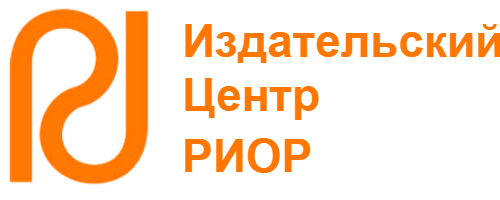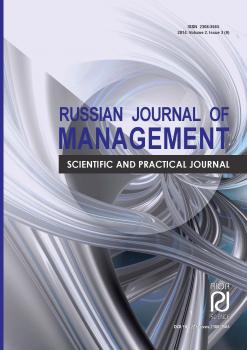from 01.01.2010 until now
State Treasury Educational Institution of Higher Education (Economic Theory and Economy of Customs Affair Department, professor)
employee
Moscow, Russian Federation
VAK Russia 08.00.05
VAK Russia 08.00.10
VAK Russia 08.00.12
VAK Russia 08.00.13
VAK Russia 08.00.14
UDC 339
CSCSTI 06.71
Russian Classification of Professions by Education 38.05.02
Russian Library and Bibliographic Classification 6549
BISAC BUS000000 General
This research focuses on the topical issue of assessing the key areas of Customs Authorities activity by intelligent modeling. A comparative analysis of the development of approaches to assess the efficiency of Customs Authorities in Russian Federation and in some foreign countries has been made in this article and enabled to reveal the genesis, current trends and directions of developing the methodology to assess Customs Authorities activity subject to their needs. Applying the intellectual measurement methodology, a computerized mathematical model was designed to assess the level of achieving the goals in performing fiscal functions by Customs Authorities. Modeling is performed by means of expert knowledge, and E.Mamdani algorithm being used as a modeling one. Computer-based implementation of a mathematical model is done on the MatLab software system platform with the help of Fuzzy Logic Toolbox software package. Quantitative results of testing a fuzzy model are used as a source data to make a multiple regression model which enabled to get a linear function linking endogenous and exogenous variables. The results of the research may be applicable in administering national Customs Authorities (Russian Federation and Eurasian Economic Union) and form the basis for developing assessment models of Customs Authorities activity.
customs assessment, customs authorities, performance measurement, finance, resources, results, assessment indicators, balanced scorecard, fuzzy logic, intelligent modeling, MatLab
1. Afonichkin A.I., Zhurova L.I. Systematization of approaches to assessing the effectiveness of the strategy for the development of micro-level economic systems // Bulletin of the Samara Municipal Institute of Management, 2019, № 1, p. 20-31.
2. Bobrova A.V. Assessment of the performance of Russian customs authorities. World Customs Journal. 2017, Volume 11, Number 2, p. 37-48.
3. Bukht R., Heeks R. (2018) Defining, conceptualising and measuring the digital economy // International Organisations Research Journal. 13(2), p. 143-172.
4. Choong K.K. Use of mathematical measurement in improving the accuracy (reliability) & meaningfulness of performance measurement in businesses & organizations // Measurement, vol. 129, December 2018, p. 184-205.
5. Gupanova Y.E., Goremykina G.I. (2023). Measurement of Customs Performance in Conditions of Customs Institute Intellectualization. In: Makarenko, E.N., Vovchenko, N.G., Tishchenko, E.N. (eds) Technological Trends in the AI Economy. Smart Innovation, Systems and Technologies, vol 625. Springer, Singapore. https://doi.org/10.1007/978-981-19-7411-3_30.
6. Ireland R., Cantens Th., Yasui T. An Overview of Performance Measurement in Customs Administrations: WCO Research Paper No. 13 (2011). http://www.wcoomd.org.
7. Kahlert J. Fuzzy Control fur Ingenieure. Braunschweig, BRD: Vieweg Verlag, 1995, 308 p.
8. Komleva N., Khlopkova O., Matthew, H. Neuroevolutional methods for decision support under uncertainty // International Journal of Civil Engineering and Technology. Volume 10, Issue 2, February 2019, p. 1263-1276.
9. Korol T. The implementation of fuzzy logic in forecasting financial ratios (2018) Contemporary Economics, 12 (2), pp. 165-188. doi:https://doi.org/10.5709/ce.1897-9254.270
10. Krichevsky M.L., Martynova J.A. Selecting an enterprise development strategy using machine learning methods/ International Journal of Engineering and Advanced Technology, V.8, Issue 4, April 2019, p. 1091-1096.
11. Leshchev S.V. Artificial-intellectual agency in the space of humanitarian dimension/S.V. Leshchev//Modern problems of the humanities and social sciences. - 2021. - № 1(33). - S. 65-68. - EDN LHJGPA.
12. Mamdani E.H., Assilian S. An experiment in linguistic synthesis with a fuzzy logic controller // Int. J. Man-Mach, 1975, Vol. 7, №1, P. 1-13.
13. Piegat A., Fuzzy Modeling and Control, Physica- Verlag, A Springer-Verlag Company, Heidelberg, 2011, 798 p.
14. Post E.L. Formal Reductions of the General Combination Decision Problem // American Journal of Mathematics, V. 65, 1943, p. 197-215.
15. Potapova, Z. E. Development of a system for measuring the intellectual strength of actors/Z. E. Potapova, I.K. Kisilevich//Modeling and data analysis. - 2021. - T. 11, NO. 3. - S. 57-73. - DOIhttps://doi.org/10.17759/mda.2021110304. - EDN MZRGWQ.
16. Prokopchina, S. V. Intellectual measurements in the era of digitalization: new opportunities and experience in use/S. V. Prokopchina//Soft measurements and calculations. - 2022. - T. 60, NO. 11. - S. 5-12. - DOIhttps://doi.org/10.36871/2618-9976.2022.11.001. - EDN LRNYKH
17. Seth P. Performance Measurement in Customs. http://www.wcoomd.org.
18. Sevastyanova, S.A., Sevastianova, A.L. Information and Knowledge: From a Resource to a Key Factor in Progres. Lecture Notes in Networks and Systems Volume 133, 2021, P. 51-58.
19. Strashkova V.O. Performance benchmark of customs authorities. Bulletin of the Scientific Conferences, 2-4(2), 2015. P. 142-144.
20. Strategy for the Development of the Customs Service of the Russian Federation until 2030: The Russian Federation Government decree of 23.05.2020 No. 1388-r.
21. The Federal Law of Russian Federation of 03.08.2018 No. 289-FZ "On customs regulation in the Russian Federation and about introduction of amendments to separate acts of the Russian Federation”.
22. The Russian Federation Government decree of 29.09.2012 No. 994 “About the System of indicators of customs authorities of the Russian Federation perfomance, an order and a technique of their monitoring”.
23. Vlasov, D. A. Content of applied mathematical training of an economist in digitalization/D. A. Vlasov//Electronic libraries. - 2020. - T. 23, NO. 1-2. - S. 25-35. - DOIhttps://doi.org/10.26907/1562-5419-2020-23-1-2-25-35. - EDN WBXODM.
24. Wang L.X. Adaptive fuzzy systems and control, design and stability analysis. Englewood Cliffs: Prentice Hall, 1994, 274 p.
25. Yashin, B. L. Non-classical logics in modern science/B. L. Yashin//Philosophical thought. - 2023. - № 1. - S. 15-25. - DOIhttps://doi.org/10.25136/2409-8728.2023.1.39350. - EDN BIGNVX.
26. Zadeh, L.A. Fuzzy sets as a basis for a theory of possibility. Fuzzy Sets Syst. 1978, 1, 3-18.
27. Zakrevskaya, E. A. Multidimensional statistical methods of processing socio-economic information/E. A. Zakrevskaya, D. A. Maksimov, N. A. Moiseev. - Moscow: Plekhanov Russian University of Economics, 2022. - 148 p. - ISBN 978-5-7307-1958-3. - EDN UXLOQC.














